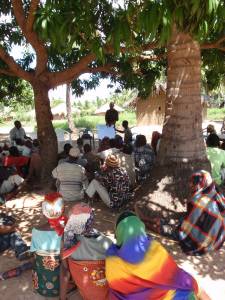GBM Blog
The launch of the report ‘Preparing for the Future? Rethinking Support for Adaptive Capacity to Climate Change’
 This blog was written by an intern in GBMI’s Europe office, Eliina Brinkber
This blog was written by an intern in GBMI’s Europe office, Eliina Brinkber
The African Climate Change Resilience Alliance (ACCRA) has, together with the Overseas Development Institute (ODI), produced a new report on how development interventions can contribute to the adaptive capacity of communities and households. Intrigued by the topic, I went to the launch of the report that was held at the ODI on the 25 January 2012 to take part in some interesting discussions with the co-writer, Simon Levin among others.
Firstly, why is this subject important? Well, change is happening all over the world: both environmental changes such as land degradation and decreases in water resources, but also social changes caused by events such as war and financial crises. Add climate change into the equation and these changes are likely to be even more extreme and less predictable. If development interventions are going to be successful they need to be sustainable in the long-term, and as Simon Levin, explained : “no development is sustainable without the ability to maintain wellbeing in the face of change.” This can be understood as the core meaning of adaptive capacity.
The findings in the report show that many of the current development interventions are in fact lacking, and sometimes even undermine the adaptive capacity of the communities and the people. Local, often small-scale development innovations and projects are overlooked in favour of implementing broader interventions, increasing the community’s vulnerability to change.
The writers of the report stress the importance of adding an agency lens to the projects. Agency can be seen as peoples “ability to develop and successfully execute their own plans”. Adding an agency lens would in this context be to not only bring a ready-made solution or technology, but also focus on supporting people’s ability to make informed choices and to develop their own innovations.
For development interventions to be sustainable and adaptive to future changes, they need to be rooted in local knowledge and real participation. The projects need to be building on ‘bottom-up’ instead of ‘top-down’ decision making, where the people in the community are truly involved. As the report highlights; “Without agency there is no adaptive capacity, and without adaptive capacity there is no sustainability or ongoing development.”
